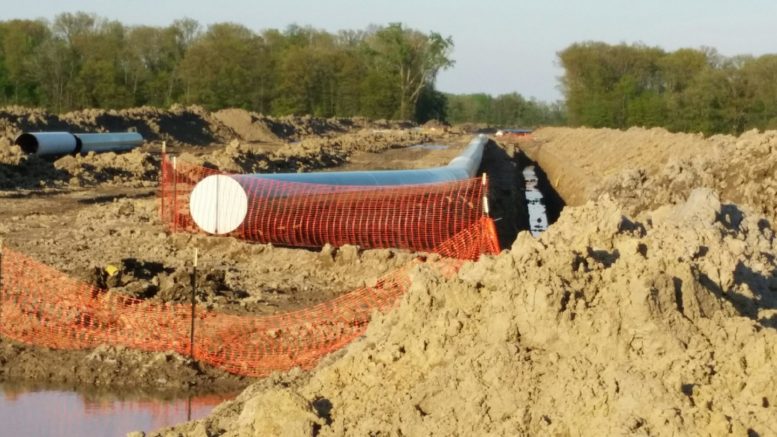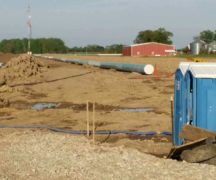By JAN LARSON McLAUGHLIN
BG Independent News
Rover Pipeline is protesting the amount of taxes it has to pay for its natural gas line buried across Ohio and through Wood County.
Local entities have been warned not to bank on the pipe dream of tax revenue predicted from the Rover Pipeline. But the promise of big money from Rover was thrilling for several entities – from libraries and parks to school districts desperate for revenue.
However, earlier this week the Ohio Township Association reported on its Facebook page that Energy Transfer, the parent company of Rover, is appealing the taxes set by the state.
According to Energy Transfer, the Ohio Department of Taxation’s valuation of the Rover Pipeline for property tax purposes is significantly higher than the amount reported in pre-construction estimates.
The assessment and the ultimate resolution will affect 18 counties that Rover runs through: Ashland, Belmont, Carroll, Crawford, Defiance, Fulton, Hancock, Harrison, Henry, Jefferson, Monroe, Noble, Richland, Seneca, Stark, Tuscarawas, Wayne and Wood.
Just last month, Wood County Auditor Matthew Oestreich reported that preliminary public utility assessments from the Rover and Nexus pipelines would potentially add approximately $350 million to Wood County’s total taxable value, making the pipelines the two top-paying taxpayers in Wood County.
But the Rover tax assessments are now on hold while pipeline protests the amount.
The Rover pipeline consists of two side-by-side pipelines which travel through Bloom, Henry, Jackson, Milton, and Perry townships. With both pipes now fully operational, the preliminary tax assessment was slated to significantly increase to $255 million from last year’s $57.5 million valuation.
But Oestreich had repeatedly warned that Rover had until Dec. 6 to appeal the assessments.
Earlier this year, Oestreich said the hesitancy by school districts and other entities to bank on the pipeline was reasonable.
“Schools are all waiting,” he said.
Rover pipeline did not appeal its tax bill for 2019, but that right to appeal is offered annually, Oestreich said.
“They can appeal next year, potentially they can do that every year,” he said.
Pipelines continue to pay local property taxes throughout a 30-year depreciation cycle. So each year of operation, the amount paid in taxes will decrease, finally bottoming out at 15 percent of the initial amount, Oestreich explained earlier this year.
Much of the skepticism with Rover’s tax payments was due to the company’s exaggerated estimates of how much local entities would reap from the pipeline coming through the area.
Some of those estimates, made when trying to win support from local entities, went as high as $3 million a year for entities like Henry Township. However, that township actually got closer to $143,000 this year.
In 2015, when the initial promise was made by Energy Transfer, former Wood County Auditor Michael Sibbersen questioned the estimates. Current county auditor Oestreich shared those concerns about inaccurate estimates being given to township officials.
“They were throwing around some rather large numbers,” Oestreich said. “I don’t think they understood Ohio taxation at all.”
The appeals process can stretch out. In the case of Troy Energy, in Troy Township, it took years before an exact number was determined, Oestreich said.
The Bowling Green School District received $758,000 earlier this year for the first Rover pipeline to go into operation. The board previously voted to put all pipeline tax revenue toward capital projects.
The news last month, that Bowling Green would get about $3 million more a year from the second Rover pipeline, was welcomed. However,school district officials have been very cautious about counting on the pipeline tax revenue.
Bowling Green School Treasurer Schuller joined Oestreich in cautioning the board about the uncertainties. First, a change in state law is being considered that would lower the tax rate on public utility property. Also, the state has the ability to change the funding formula to reduce the state aid to districts that get pipeline revenue.
The Bowling Green district’s financial advisor, David Conley, from Rockmill Financial Inc., has also pointed out that the pipeline revenue is an uncertainty since the state sometimes takes that revenue from some districts to give to others that are struggling financially.
“They siphon it off and send it someplace else,” he said. “Lobbyists are being paid a lot of money to take money away from you.”



